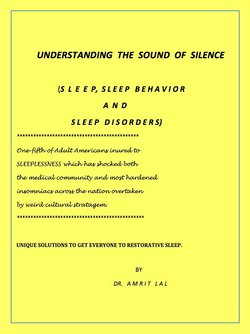Читать книгу Understanding the Language of Silence - Sleep, Sleep Behavior and Sleep Disorders - Dr. Amrit Lal - Страница 13
На сайте Литреса книга снята с продажи.
PHASES OF MOON & SLEEP
ОглавлениеThe myth (or perhaps a fact) that phases of moon, in particular full moon, affect human sleep, mood, behavior and sanity has survived for a long time in popular folklores of many cultures. But this association has been dismissed as “moonstruck” and “lunatic” in pre-scientific days. Nonetheless, some members of the science community still support this association by correlating sleep data with phases of moon. Recently, this topic was investigated in detail at the Center for Chronobiology at the University of Basel, Switzerland by a group of scientists headed by Dr. Christian Cajochen who looked at the relevant data between 2000 and 2003 on the effect of phases of moon on daily body clock and sleep patterns of 33 healthy men and women volunteers between the ages of 20 and 74 in a sleep laboratory correlating the data on sleep with phases of moon. The results appeared in Current Biology, August 5, 2013. These volunteers were quarantined, shut away from daylight and moonlight for days at a time so that their sleep patterns were not affected by the illumination of a full moon. The findings of the experiment confirmed that the “phase of the moon does affect human sleep patterns, even when the humans cannot possibly see the moon. EEG (Electroencephalography) recordings showed “the volunteers slept, on an average, 20 minutes less around the time of full moon. It also took 5 minutes longer to get to sleep; their delta sleep (a measure of deep sleep) was also 30 % lower than other times,” their level of melatonin also went down. And they reported, subjectively, they had not slept well as usual.” These findings mean that the effect of full moon on sleep is not a “lunatic” idea, after all and the notion on mysterious power of lunar cycles from increase in violent crimes to hospital admissions in not nonsensical after all. However, as of now this remains a relatively unchartered area of research and it may well be that to extend the research if phases of moon affect both sexes and all age groups equally or the elderly are more/less affected by this natural phenomenon. Professor Cajochen who led the study was himself and surprised and puzzled by the findings. “The only explanation we could come up with is that maybe there is a lunar clock in the brain, as found in other species like fish and other marine animals,” he said. “But we don’t have any direct evidence for that,” he added.
